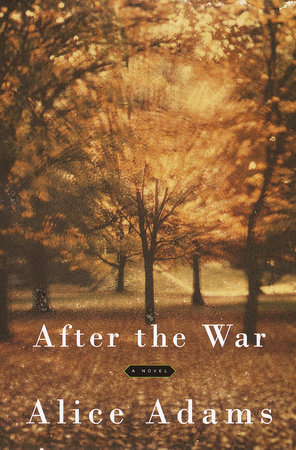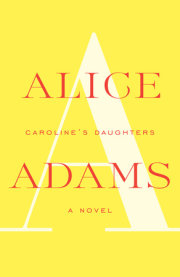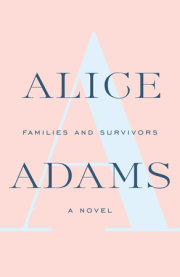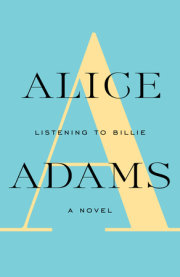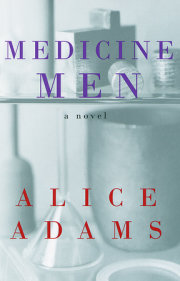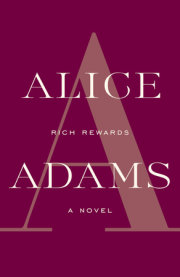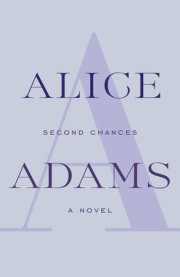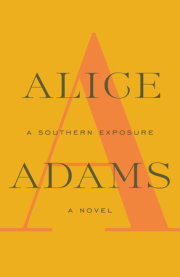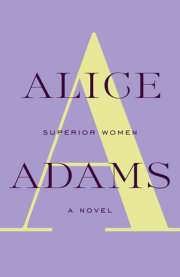Chapter OneBy mid-August, in the third summer of the Second World War, heavy and relentless heat had yellowed all the grass and almost all the flowers in the little college town of Pinehill, in the middle South. Cynthia Baird, an actively unfaithful Navy wife, contemplated the limp petals that lay beneath what had been a beautiful display of roses, massed blossoms of gold to pink to white -- although she was not thinking of roses, nor actually of the war, but rather of her lover, Derek McFall, the famous war correspondent. Derek, who was tall and blond and not in love with her, not at all. Cynthia thought too of her husband, Harry -- Captain Harry Baird, USN, now in London -- but less often than she thought of Derek; Harry and wartime London, as well as the war itself, were vague to Cynthia, as they were to most of the rest of that town. People there were more aware of the state of Cynthia's lawn and her flowers, of their own lawns and flowers, than of the terrible but distant war. If they had known about Derek and Cynthia, they would have given that some thought, and much talk, but so far they did not.
In the town's view Cynthia was still a transplanted Yankee, from Connecticut; over five years now but her Yankee ways and those of Harry were still remarked on, in Pinehill. And the trouble with the lawn and the flowers was that the Bairds were hardly there in Pinehill anymore, since Harry went up
to Washington to work for the Navy, and then was sent off to London. They actually lived in Washington -- Georgetown, of course; there was a rumor about Cynthia going to law school in Georgetown, but she gave that up, of course, when Harry went to London. Abigail, their daughter, came down to Pinehill more often than they did during the Georgetown days, but she did not do any gardening chores; she came to stay with her friend Melanctha Byrd, and they both went out with a lot of boys. Abigail had always been independent -- "a regular Yankee child, always does pretty much what she wants to, always has."
But now Cynthia lived mostly in Pinehill, and it was too bad that the garden looked so pathetic, especially today: Cynthia was having an important party that she said was for Abigail, and for Melanctha too. The girls were both going up North to college in just a few weeks, Abigail to Swarthmore, a Quaker place that had boys as well, and Melanctha to Radcliffe, the girls' part of Harvard.
What gardening got done at the Bairds' house these days was done by Odessa, the maid. Odessa actually lived at the Bairds', sort of, in the out back -- "real nice of Cynthia to take her in like that, but sort of Yankified, wouldn't you say?" In any case, Odessa had enough to do just keeping the house in shape, not to mention certain problems of her own: a wandering husband, Horace (too bad: Horace was a wonderful gardener, just terrific with flowers, but he'd been off somewhere all summer); a daughter in trouble at the defense plant -- Nellie, Odessa's only child, and no one knew just what kind of trouble, but they had their own ideas.
But the garden was nobody's fault, not Abigail's or Odessa's, but probably the Lord's. Or the war's, like everything else.
Odessa's husband, Horace, was actually in the Navy, in the Pacific Ocean. He was overage but he looked young, and he'd lied about his age, and Odessa saw no point in telling anyone (no one white) where he was, and she never had, not even Miz Baird, who had treated her good. But she sorely missed him, and all she got were little notes sometimes that Horace got some man there with him to write. She didn't even know just where he was, but sometimes on the radio she heard these Japanese-sounding names, Okinawa, Hirohito, and talk about boats and battles, and she was scared, just plumb dumb scared, and not a single thing she could do about it, and not a person to tell. And then Nellie: some white folks' crazy talk about a union over to the plant, which would end up getting her fired, Odessa knew. Some crazy students from over to Hilton. Every time the phone rings in the house, which is not too often these days with them all off somewheres, Odessa was mortally afraid of terrible news: Horace, or Nellie, or even Mr. Baird, off in the Navy too, though not with the same uniform at all that Horace wears.
Cynthia was not looking forward to her party. For one thing, it was planned as a by-the-pool party, and she might not hear the phone from the pool, and Derek might call; all day she has had a strong sense of the imminence of Derek. Odessa will be up at the house to answer some of the time, but there's all the food to bring out, and more glasses and fresh ice -- always something. Odessa could all too easily not hear the phone. Really smart of me, Cynthia thinks, to be waiting like a sixteen-year-old for a phone call --congratulations, dumbbell -- and a phone call from a man who doesn't even love you, he says. She frowns and tries to concentrate on what's to be done.
Sliced cold ham, a notch up from the usual cold fried chicken, and a cold green rice salad, two notches up from potato salad. Odessa's beaten biscuits, locally famous, and Odessa's fresh peach ice cream. Divine.
A nice lunch, the problem being that she doesn't really care for any of the guests -- except of course for the two girls of honor, her own dearest Abigail, who actually has been a considerable pain in the butt, of late, and dear Melanctha Byrd, who at times looks so unnervingly like Russ, and who seems unhappy, poor child. And no wonder, with those great big breasts almost weighing her down -- just like her mother, poor SallyJane. Does Melanctha drink too? Well, probably not yet. But she'll always have trouble buying clothes.
Cynthia herself, a former Vassar Daisy Chain girl, is tall and thin, is made for clothes -- as salesladies have often told her. And Abigail, an inch less tall and a tiny bit heavier than her mother, could wear almost anything if she cared to, but she does not; she does not give a fig about clothes, she wears any old thing and gets by with it because she is so young, and pretty, really (if she'd only do something about her hair).
But the person Cynthia surely does not want to see, who always makes her uncomfortable, is James Russell Lowell Byrd, father of Melanctha. Russ, who was once a famous poet and a playwright, now just writes screenplays, sometimes -- he was the true reason that Cynthia and Harry moved to Pinehill in the first place: Cynthia wanted to meet the poet, she loved his words. And a few years later it had happened, they had had the affair that she had always had in mind. Which had been terrific, in its way, but all that is left of it now is social embarrassment. Discomfort at seeing each other. Russ must feel it too, she is sure, along with guilt; it happened so soon after the death of SallyJane, his wife, mother of Melanctha -- poor SallyJane with the overlarge bosom, who drank too much and then died of the shock treatment they gave her for depression. Now Russ is married to Deirdre, who used to be the most beautiful girl in town, and who had a little boy with Russ before they were married, and now has a little baby girl, unaccountably named SallyJane. Cynthia sighs, and she thinks for the thousandth time, I will never understand the Southern mind, not in any way.
Cynthia does not want to see Russ, nor her supposed best friend, Dolly Bigelow (Dolly is just too idiotic, some of the time) -- nor Jimmy Hightower, another "dear friend," a former Oklahoma oilman who with Russ's help wrote one best-seller. The person she would actually like to see is Esther, Jimmy's wife, who is in New York now doing something with Jewish refugees.
She was glad, Cynthia was, that none of the grown-ups have chosen to wear their bathing suits. They're mostly too old and too fat, a lot of them. Dolly Bigelow is very plump, and her husband, Willard, too; Deirdre Byrd is truly fat (could she possibly be pregnant again? Russ has this crazy thing about birth control: SallyJane told several people that, and Cynthia had what you might call firsthand knowledge). Curiously, the men looked better than the women did: Russ looked really okay (all that time at Hollywood swimming pools, probably), and Jimmy Hightower's exactly the same as always. Cynthia thought then with a pang of guilt and longing of Harry, so trim and elegant in his Navy things -- and then of Derek, so very tall and thin, in his belted trench coat, with his pipe.
By mid-afternoon, no one had really drunk too much except Deirdre Byrd; she did not seem exactly tight, but Cynthia had observed her: lots and lots of gin-and-tonics, there in the waning sun, in the warm smell of grass and flowers and chlorine. Dolly Bigelow had also been aware of Deirdre's drinking, and Cynthia had observed Dolly watching Deirdre. Dolly and Cynthia viewed each other with equal parts of suspicion and affection.
Dolly suspected that a while back there was something going on between Cynthia and Russ Byrd, not long after SallyJane died. About the time that Dolly and Cynthia opened that little store, with some things that Odessa had made along with things by white ladies too, from out in the country. The store didn't work out too well, and probably if they'd've kept it, the war would've finished it anyway. But: Cynthia and Russ. How could a thing like that have come to any good? Lord knows Dolly was no prude, but she really didn't hold with married folk carrying on, you're supposed to keep the promises you made in church. Russ Byrd is a handsome man all right, but then so is Harry Baird, especially now in his naval uniform. How many handsome men does Cynthia need -- what is she, some kind of a nymphomaniac? Besides, Dolly never had what you might call evidence, just a hunch from their ways of looking at each other, of saying each other's name.
"This is just the best rice salad I have ever tasted," Dolly said to Cynthia. "You sure have taught Odessa a thing or two," and she smiled, very sweetly.
Cynthia suspected that as usual Dolly was wearing falsies inside her dress, and for what, for whom? Certainly not foggy Willard, her boring husband, who taught Greek and Latin at the local college; she doubted that Willard had had a sexual thought in his head or anywhere else for fifteen or sixteen years, which was how old their younger boy was. She smiled back at Dolly as she told her, "I made it myself, actually. But I'm sure Odessa could have done it better."
Cynthia believed that in some private and half-conscious way Dolly had it in for Odessa, and not just because Odessa was "colored" and Dolly was a Southern woman; it was more personal than that. As though Odessa was not really "Negro" enough for Dolly.
Unlike the lawns, the rest of the garden and the planting around the pool have done well. Flowering sweet-smelling privet thrived, and the lilac bushes that Cynthia, missing New England, insisted on. Next spring they will bountifully, beautifully bloom -- assuming that we're all here next spring, thought Cynthia, who was not at all sure what she meant. Nothing to do with the war, probably; she did not think that Hitler would win in Europe and then come over here with his Blackshirts and Storm Troopers and concentration camps. Although some people seemed to believe just that; Cynthia's friend Esther Hightower seemed to believe it. But Cynthia's sense of impermanence had more to do with the fragility of personal connections, specifically her own: with Harry, who was doing God-knows-what in London, and with Abigail, her very own and only daughter, always so independent, so intelligent. And now off to Swarthmore, so far away, difficult to get back from there, what with wartime transportation.
And then there was Derek, with whom anything at all could happen, or, just as possibly, nothing.
Copyright © 2000 by Alice Adams. All rights reserved. No part of this excerpt may be reproduced or reprinted without permission in writing from the publisher.

